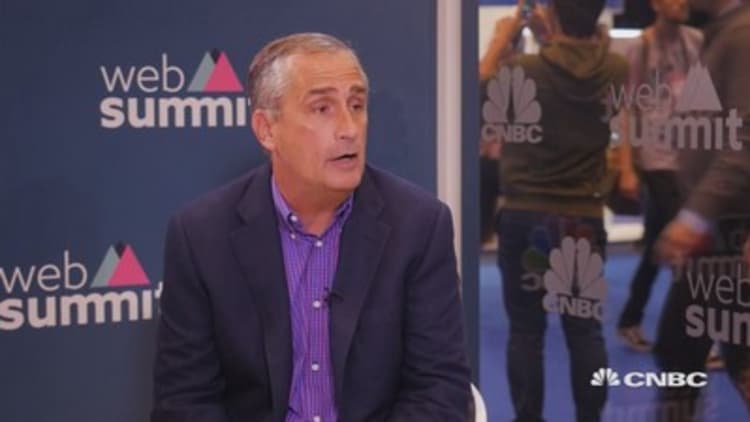
Artificial intelligence (AI) is in its "infancy" and it's too early to regulate the technology, Intel CEO Brian Krzanich told CNBC on Tuesday.
Major figures in the technology and science world have warned of the potential dangers of artificial intelligence. Tesla and SpaceX CEO Elon Musk said the AI race could cause World War III, while famed physicist Stephen Hawking said Monday that the technology could be the "worst event in the history of our civilization."
Lawmakers in the European Parliament in February even proposed rules to regulate AI and robotics.
But Krzanich warned against any regulation of AI right now.
"AI is only going to go into applications that we allow it to go into ... it's in its infancy," Krzanich told CNBC in a TV interview from the sidelines of the Web Summit technology conference in Lisbon, Portugal.
"It would be too early to do any kind of regulation today. What would you regulate around artificial intelligence today? We need to foster the innovation and allow it to grow. We are at the beginning stages of artificial intelligence."
During the interview, Krzanich talked up the potential of AI to be used in health care, suggesting that it can detect issues with people before a human can. The Intel CEO also used his keynote speech during the Web Summit to talk about where the company is using AI and data in sports and driverless cars.
Many business leaders have warned about the big impact that AI may have on jobs. But Krzanich said that the technology could help treat more people in medicine, for example.
"Every time there has been a big shift in technology, go back to cars or airplanes, people thought the industries were going to die, people were going to be out of work. What happened is it shifted and it actually augmented and allowed even more jobs, more opportunity, more commerce and so AI is going to do the same thing," Krzanich told CNBC.
"It doesn't mean there [are] less skilled workers, it means they are able to focus and we're able to treat more people … we're able to serve more of mankind with the skills that we have."





